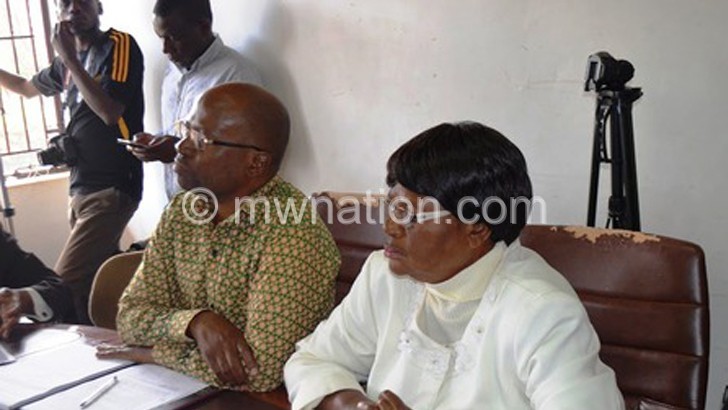Lilongwe sewage horror not over
The threat of Area 18 residents and those in other parts of Lilongwe consuming water contaminated with sewage is not over yet, according to Lilongwe Water Board (LWB) chief executive officer (CEO) Alfonso Chikuni.
On Tuesday last week, some residents of Area 18 had sewage-filled water flowing from their taps, a development which was later confirmed and regretted by LWB.
Following the incident, Malawi Human Rights Commission (MHRC) yetserday held a public inquiry in Lilongwe to get the views of different stakeholders including Malawi Housing Corporation (MHC), LWB, Lilongwe City Council (LCC) and the affected residents.
In his testimony before the panel which comprised MHRC commissioners Patrick Semphere and Bertha Sefu, Chikuni was at pains to stress that he could not give any assurance that the Area 18 incident will not recur.

from LWB during the hearing
He attributed his position to the fact that there still are old water and sewage pipes which continue posing a threat to the status of the water that people use for domestic purposes.
“Our responsibility is to provide clean and potable water to all Lilongwe City residents in line with the Water Works Act of 1995. While the Act places the responsibility of managing the city’s sewer system in the hands of Lilongwe Water Board, it is currently being managed by Lilongwe City Council.
“We immediately rectified the Area 18 problem after it was reported to us but the sewage is still flowing. We are also victims of the incident, that is why I cannot make an assurance that it will not happen again,” Chikuni said.
He added that while LWB is working on replacing the old pipes, it is not a task that can be concluded overnight as it is both costly and involving such that if sewage spills in any of the city’s areas and a water pipe has burst, then the water will obviously be contaminated.
Said Chikuni: “For instance, just yesterday, the flow of the sewage increased and in this case, we cannot guarantee that the water will not be contaminated again. The remedy would be to shut down the system completely but we cannot do that because the law does not permit us.”
The LWB CEO attributed the existence of worn out and rusty water pipes to a backlog of investments where the materials were not being replaced despite that some of them are over 50 years old.
LCC acting CEO Charles Makanga disclosed that after receiving a report on the incident, technical officers visited the scene where MHC engineers were already working on the blocked sewer pipe which had resulted into the breakage.
“After two days, the sewer pipe was blocked again. Then two days later, the same thing happened. The biggest problem is coming from people who remove the manhole covers and then others who throw things there like stones,” Makanga said. n





